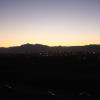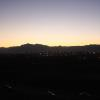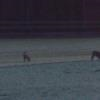Visibility of Jumadal Al-Aula Crescent 1437 AH
- When to Observe Jumadal Al-Aula Waxing (NEW) Crescent ?
- Jumadal Al-Aula Waxing (NEW) Crescent Observation Results
- The OFFICIAL First Day in Different Countries
- When to Observe Rabee' Al-Aakher Waning (OLD) Crescent ?
- Rabee' Al-Aakher Waning (OLD) Crescent Observation Results
When to Observe Jumadal Al-Aula Waxing (NEW) Crescent ?
The geocentric conjunction (Geocentric New Moon) will occur Inshalla on (Monday 08 February 2016) at 14:39 UT.
Sighting the new crescent on (Monday 08 February 2016) and (Tuesday 9 February 2016) is shown in the below graphs using the program Accurate Times by Mohammad Odeh according to Odeh criterion. Where:-
- It is impossible to see the crescent from the areas located under the red color. Because either the Moon on this day sets before the Sunset and/or the topocentric conjunction occurs after the Sunset.
- The crescent is expected to be seen by optical aid only from the areas located under the blue color.
- The crescent is expected to be seen by optical aid from the areas located under the magenta color. In these areas the crescent could be seen by naked eye if the atmospheric conditions are superb and the observer is experienced.
- The crescent is expected to be easily visible by naked eye from the areas located under the green color.
- The crescent cannot be seen from uncolored areas, even though the Moon sets in these locations after the Sunset and the topocentric conjunction occurs before the Sunset, but the Moon is not sufficiently illuminated in order to be seen as crescent even by optical aid.
- Kindly notice that the below graph shows the possibility of seeing the crescent from areas between 60 degrees north of Equator down to 60 degrees south of Equator.
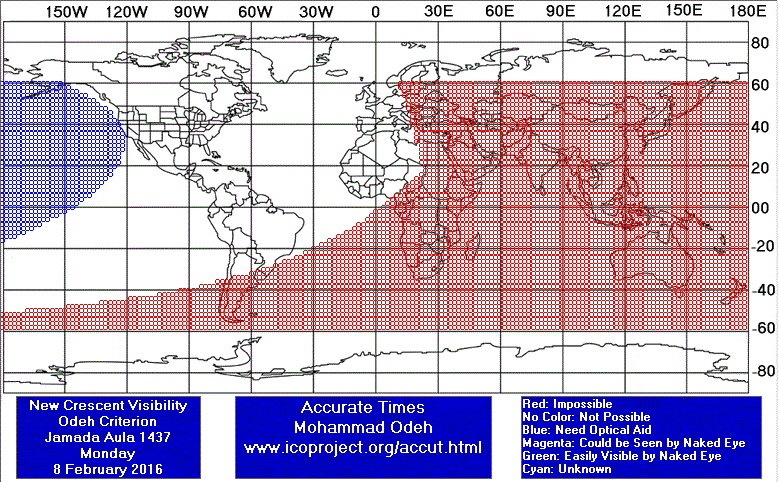
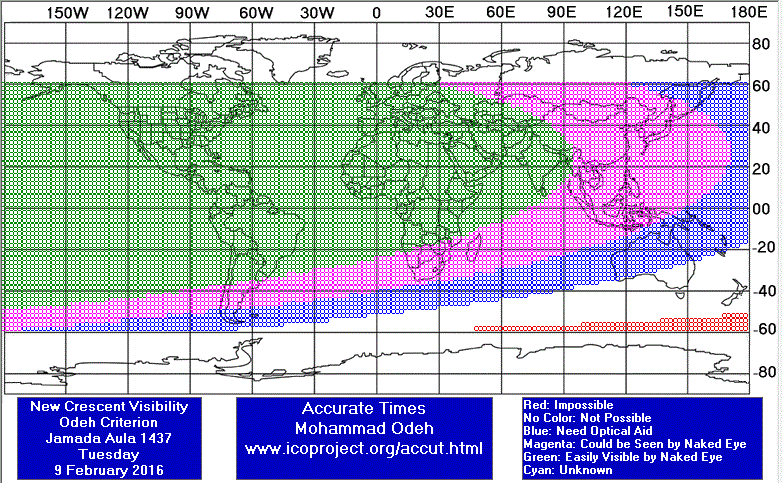
According to the Universal Hejric Calendar (UHC), which is based on the calculated crescent visibility, the start of this month in the Eastern Region will be on Wedensday 10 February 2016 and in the Western Region will be on Wedensday 10 February 2016. Kindly notice that the UHC is a pre-calculated calendar, which adopts a certain criterion to start the new Hejric month. Your country/organization might adopt different criterion to start the new Hejric month. So it is highly advised to read the UHC website before giving any judgment.
- Results of seeing the crescent, and the first day of the month in different countries will be added here Inshalla as we receive the reports from ICOP's members. If you wish to be a member in ICOP, or to know more about it, kindly click here.
Jumadal Al-Aula Waxing (NEW) Crescent Observation Results
Mon 08 February 2016
Libya
Morocco
Tue 09 February 2016
Australia
Ghana
Mr. Baba Abdulai said: "Date of sighting effort; Tuesday February 9, 2016. The crescent was NOT seen in this location. I was at the sighting post between 18:10 to about 18:40 but I did not see the crescent. The sky was very hazy with dust all around. I could barely see the stars above my head. In the western horizon itself, I could not even see any star. With about 28 hours after conjunction and a one hour moon lag time, I actually expected that I would see the crescent. Maybe the dusty and hazy atmosphere denied me. And Allaah (SWT) Knows Best. Sighting location; Tiyumba School Park, (near Lowlandi Rice Processing Centre), Tamale."
Indonesia
Mr. AR Sugeng Riyadi said: "The new crescent of Jumadal Ula 1437 AH was NOT sighted on Tuesday, Feb 09, 2016 from my location at Juwiring Klaten Central Java. But the moon was SEEN from Makassar, Ambon, Kupang and Ternate. The 1st of Jumadal Ula 1437 AH will on Wednesday, Feb 10, 2016."
Iran
Mr. Hossein Janghorbani said: "In the name of God Jumadal Al-Aula Crescent Observation Report Astronomy and Geophysics Center of Shahreza – The Crescent Association of Shahreza Report by: Hossein Janghorbani (NajmoSepehr-Sadrolmonajjemin) – Manager of Shahreza Crescent Association and Red Crescent’s Astronomy and Geophysics Center Date: Tuesday, 02/09/2016 Location: Damzad foothills in the East of Shahreza (latitude: 32 00 N, longitude: 51 52 E, elevation: 1825m from sea level, time zone: +3.5 GMT) Equipments: two set of 15*70 binoculars, one sets of 20*90 binoculars, one compass. Atmospheric condition: hazy Horizon obstacles: about 2/5° Apparent Sunset: 17:30 Results: Moon crescent was seen by 20*90 binoculars by Mahsa Khajeh at 17:50, for the first time. Other group members observed crescent by binoculars subsequently. Crescent observed by Hossein Janghorbani 17:55 by naked eye. Other group members observed crescent by naked eye. Observers: 1.Arezoo Tabibian 2.Naeemeh Sadat Saniee 3.Fatemeh Hadad 4.Mahsa Khajeh 5.Nazanin Piroozmandan 6.Zahra Jamali 7.Ziba Hafar 8.Masoomeh Hafar 9.Zinat Ghermezi 10.Roya Ghermezi 11.Zahra fallahi 12.Hossein Torabi 13.Davood Javeri 14.Fariborz Khajeh 15.Mohammad Sadra Nikeghbal 16.Mohammad Javad Nikeghbal 17.Sayed Farzad Alavi 18.Sayed Abolfazl Kahangi 19.Abdolreza Gholami 20.Mahdi Ghasemi 21.Reza Janghorbani 22.Ali Janghorbani 23.Hossein Janghorbani "
Mr. Hossein Janghorbani said: "In the name of God Jumadal Al-Aula Crescent Observation Report Astronomy and Geophysics Center of Shahreza – The Crescent Association of Shahreza Report by: Hossein Janghorbani (NajmoSepehr-Sadrolmonajjemin) – Manager of Shahreza Crescent Association and Red Crescent’s Astronomy and Geophysics Center Date: Tuesday, 02/09/2016 Location: Damzad foothills in the East of Shahreza (latitude: 32 00 N, longitude: 51 52 E, elevation: 1825m from sea level, time zone: +3.5 GMT) Equipments: two set of 15*70 binoculars, one sets of 20*90 binoculars, one compass. Atmospheric condition: hazy Horizon obstacles: about 2/5° Apparent Sunset: 17:30 Results: Moon crescent was seen by 20*90 binoculars by Mahsa Khajeh at 17:50, for the first time. Other group members observed crescent by binoculars subsequently. Crescent observed by Hossein Janghorbani 17:55 by naked eye. Other group members observed crescent by naked eye. Observers: 1.Arezoo Tabibian 2.Naeemeh Sadat Saniee 3.Fatemeh Hadad 4.Mahsa Khajeh 5.Nazanin Piroozmandan 6.Zahra Jamali 7.Ziba Hafar 8.Masoomeh Hafar 9.Zinat Ghermezi 10.Roya Ghermezi 11.Zahra fallahi 12.Hossein Torabi 13.Davood Javeri 14.Fariborz Khajeh 15.Mohammad Sadra Nikeghbal 16.Mohammad Javad Nikeghbal 17.Sayed Farzad Alavi 18.Sayed Abolfazl Kahangi 19.Abdolreza Gholami 20.Mahdi Ghasemi 21.Reza Janghorbani 22.Ali Janghorbani 23.Hossein Janghorbani "
Iraq
Morocco
Dr. Hassan Talibi said: "إلى حدود كتابة هذه السطور لم تعلن بعد وزارة الأوقاف الدخول الشرع في شهر جمادى الأولى والغالب أنها ستعلن ذلك لأن رؤيته اليوم. ولتشجيع الناشئة على مراقبة الظواهر الفلكي استصحبت ابن الجيران لاهتمامه بعلم الفلك ورغبته في التعرف على مجالاته حيث كانت أول تجربة يخوضها لرصد الهلال."
Saudi Arabia
Mr. Turki Alamri said: "First sight was 12:00 pm LT by ccd cam after sunset i tried to see it by naked eye but i could not , 25 minutes later was the first sight by naked eye. CCD IMAGE INFORMATION at 12:00 pm LT AOT 500 NM =0 .14 TOD 500 NM = 0.2 "
Sri Lanka
Mr. Nular Bary said: " Today 29th Rabi-al-Thani 1437H (9/2/2016) evening the Colombo western sky was cloudy and couldn't see the new Moon and no positive sighting reported to our Hillal committee from any part of Sri Lanka. Hence The Colombo Grand Mosque Hillal Committee decided to complete the month of Rabi-Al-Thani with 30days and start the month of Jumada-Al-Oola on Thursday 11th. February 2016 "In Sha Allah" "
Mr. Abdul Rahman Razeen said: "A.alaikum. Sorry for the delay. Today the evening of 9-02-2016AD=29-4-1437AH was the sighting day in Srilanka for the month of Jumadal-oola 1437AH.On the previous day I traveled to Mannar to find out places which is relevant for hilal sighting.The lat and long of Mannar is 8deg 59',79deg 54'.On 9th morning i traveled around Mannar district with some ulama's and selected 3 places which is relevant for proper sighting.They are Olathoduvai,Thalaimannar south beach and Silabathurai. The lag was 46mnts on the sighting day..The prediction of the astronomers was " favorable for naked eye sighting". As a Fardh-Kifayah our C.G.M.H.C. with the A.C.J.U.H.C. arranged hilal sighting authority groups right around Srilanka. We received negative reports from the sighting groups due to cloudy weather in the horizon.Hence it was decided by the president of the C.G.M.H.C.Moulana Riyadh (Baari) to complete the month of Rabeeunil akir as 30days and to begin the month of Jumadal-oola on Thursday 11th of February 2016"
Tanzania
Mr. Zaffar Sheriff said: "Cloud cover over western horizon."
United Kingdom
Mr. Muhammad Arshad Dar said: "Western horizon was totally covered with heavy clouds. "
Eng. Qamar Uddin said: "I was hoping to see the 26 hrs old moon, but it was too cloudy. However, we received positive sighting reports from Morocco."
The OFFICIAL First Day in Different Countries
Wed 10 February 2016
1 . Indonesia
2 . Libya
3 . Morocco
4 . United Kingdom
Thu 11 February 2016
1 . Australia
When to Observe Rabee' Al-Aakher Waning (OLD) Crescent ?
The geocentric conjunction (Geocentric New Moon) will occur Inshalla on (Monday 08 February 2016) at 14:39 UT.
Sighting the OLD crescent on (Monday 08 February 2016) and (Sunday 7 February 2016) is shown in the below graphs using the program Accurate Times by Mohammad Odeh according to Odeh criterion. Where:-
- It is impossible to see the OLD crescent from the areas located under the red color. Because either the Moon on this day rises after the Sunrise and/or the topocentric conjunction occurs before the Sunrise.
- The crescent is expected to be seen by optical aid only from the areas located under the blue color.
- The crescent is expected to be seen by optical aid from the areas located under the magenta color. In these areas the crescent could be seen by naked eye if the atmospheric conditions are superb and the observer is experienced.
- The crescent is expected to be easily visible by naked eye from the areas located under the green color.
- The crescent cannot be seen from uncolored areas, even though the Moon rises in these locations before the Sunrise and the topocentric conjunction occurs after the Sunrise, but the Moon is not sufficiently illuminated in order to be seen as crescent even by optical aid.
- Kindly notice that the below graph shows the possibility of seeing the crescent from areas between 60 degrees north of Equator down to 60 degrees south of Equator.
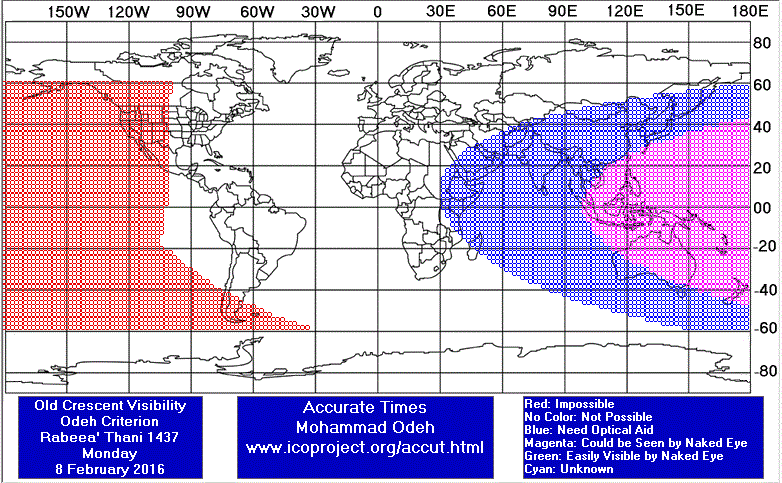
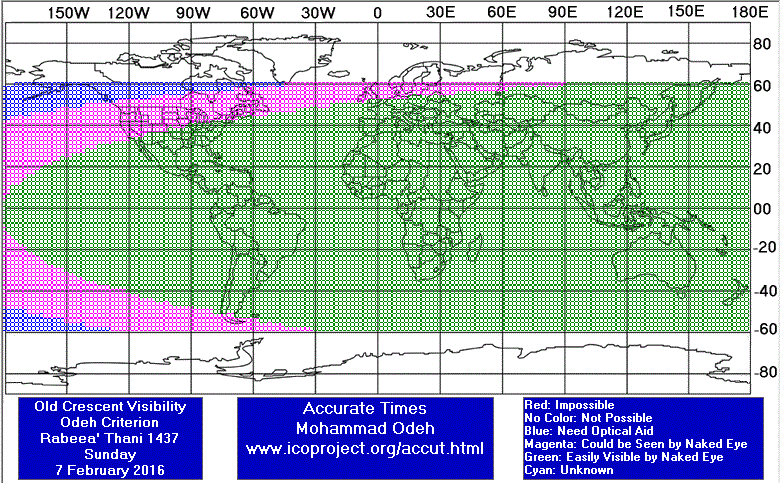
Rabee' Al-Aakher Waning (OLD) Crescent Observation Results
Sun 07 February 2016
Germany
Eng. Martin Elsaesser said: "Despite some clouds near the horizon the crescent could be easily seen with binoculars and also the unaided eye. Some grazing deer could be seen in the distance."
Indonesia
Mr. AR Sugeng Riyadi said: "The old crescent of Rabiul Akhir 1437 AH was seen from Sarangan Magetan East Java. I observed the moon with my friends, ust. Darmawan, ust. Ichsan Sani and ust. Nanang Zainuddin on Sunday, Feb 08, 2016."
